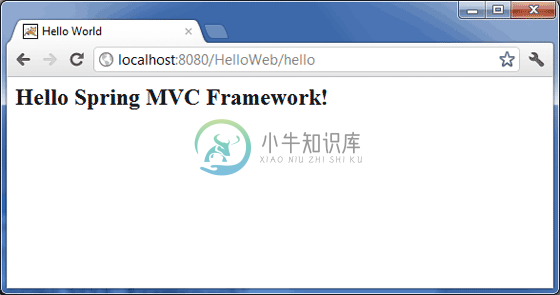Hello World Example
以下示例说明如何使用Spring MVC Framework编写基于Web的简单Hello World应用程序。 首先,让我们使用一个可用的Eclipse IDE,并按照后续步骤使用Spring Web Framework开发动态Web应用程序。
| 步 | 描述 |
|---|---|
| 1 | 使用名称HelloWeb创建一个动态Web项目,并在创建的项目中的src文件夹下创建一个包cn.xnip。 |
| 2 | 将以下Spring和其他库拖放到WebContent/WEB-INF/lib文件夹中。 |
| 3 | 在cn.xnip包下创建一个Java类HelloController 。 |
| 4 | 在WebContent/WEB-INF文件夹下创建Spring配置files web.xml和HelloWeb-servlet.xml 。 |
| 5 | 在WebContent/WEB-INFfolder下创建一个名为jsp的子文件夹。 在此子文件夹下创建一个视图文件hello.jsp 。 |
| 6 | 最后一步是创建源文件和配置文件的内容并导出应用程序,如下所述。 |
HelloController.java
package cn.xnip;
import org.springframework.stereotype.Controller;
import org.springframework.web.bind.annotation.RequestMapping;
import org.springframework.web.bind.annotation.RequestMethod;
import org.springframework.ui.ModelMap;
@Controller
@RequestMapping("/hello")
public class HelloController{
@RequestMapping(method = RequestMethod.GET)
public String printHello(ModelMap model) {
model.addAttribute("message", "Hello Spring MVC Framework!");
return "hello";
}
}
web.xml
<web-app id = "WebApp_ID" version = "2.4"
xmlns = "http://java.sun.com/xml/ns/j2ee"
xmlns:xsi = "http://www.w3.org/2001/XMLSchema-instance"
xsi:schemaLocation = "http://java.sun.com/xml/ns/j2ee
http://java.sun.com/xml/ns/j2ee/web-app_2_4.xsd">
<display-name>Spring MVC Application</display-name>
<servlet>
<servlet-name>HelloWeb</servlet-name>
<servlet-class>
org.springframework.web.servlet.DispatcherServlet
</servlet-class>
<load-on-startup>1</load-on-startup>
</servlet>
<servlet-mapping>
<servlet-name>HelloWeb</servlet-name>
<url-pattern>/</url-pattern>
</servlet-mapping>
</web-app>
HelloWeb-servlet.xml
<beans xmlns = "http://www.springframework.org/schema/beans"
xmlns:context = "http://www.springframework.org/schema/context"
xmlns:xsi = "http://www.w3.org/2001/XMLSchema-instance"
xsi:schemaLocation = "
http://www.springframework.org/schema/beans
http://www.springframework.org/schema/beans/spring-beans-3.0.xsd
http://www.springframework.org/schema/context
http://www.springframework.org/schema/context/spring-context-3.0.xsd">
<context:component-scan base-package = "cn.xnip" />
<bean class = "org.springframework.web.servlet.view.InternalResourceViewResolver">
<property name = "prefix" value = "/WEB-INF/jsp/" />
<property name = "suffix" value = ".jsp" />
</bean>
</beans>
hello.jsp
<%@ page contentType = "text/html; charset = UTF-8" %>
<html>
<head>
<title>Hello World</title>
</head>
<body>
<h2>${message}</h2>
</body>
</html>
以下是要包含在Web应用程序中的Spring和其他库的列表。 我们可以拖动这些文件并将它们放入WebContent/WEB-INF/lib文件夹中。
servlet-api-x.y.z.jar
commons-logging-x.y.z.jar
spring-aop-x.y.z.jar
spring-beans-x.y.z.jar
spring-context-x.y.z.jar
spring-core-x.y.z.jar
spring-expression-x.y.z.jar
spring-webmvc-x.y.z.jar
spring-web-x.y.z.jar
完成创建源文件和配置文件后,导出应用程序。 右键单击您的应用程序,使用Export → WAR File选项并将您的HelloWeb.war文件保存在Tomcat的webapps文件夹中。
现在启动Tomcat服务器,确保您能够使用标准浏览器从webapps文件夹访问其他网页。 现在,尝试访问URL - http://localhost:8080/HelloWeb/hello 。 如果Spring Web Application的一切正常,我们将看到以下屏幕。

您应该注意,在给定的URL中, HelloWeb是应用程序名称,hello是虚拟子文件夹,我们在控制器中使用@RequestMapping(“/ hello”)提到了它。 使用@RequestMapping("/")映射URL时可以使用直接root,在这种情况下,您可以使用短URL http://localhost:8080/HelloWeb/访问同一页面,但建议在不同的功能下使用不同文件夹。

